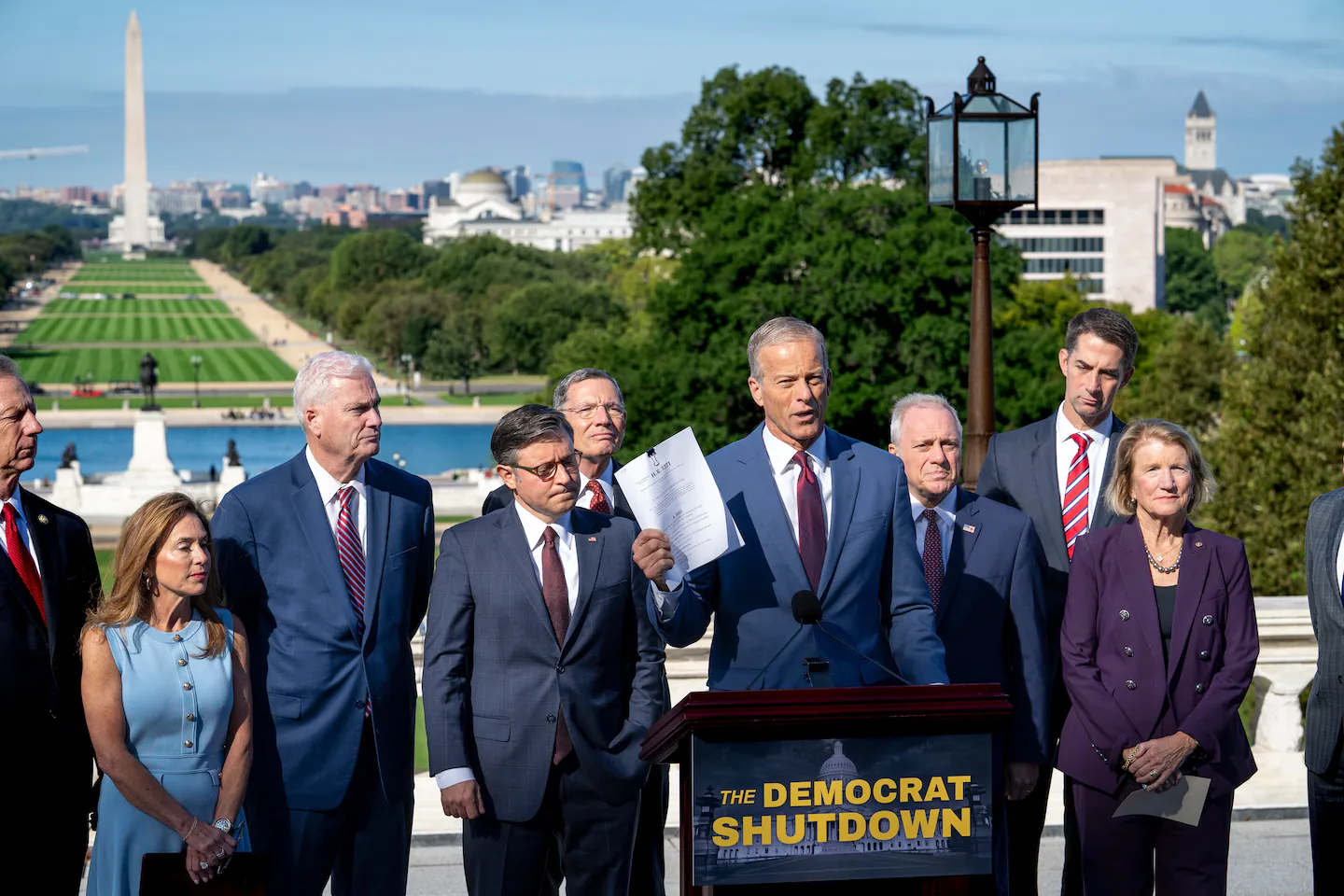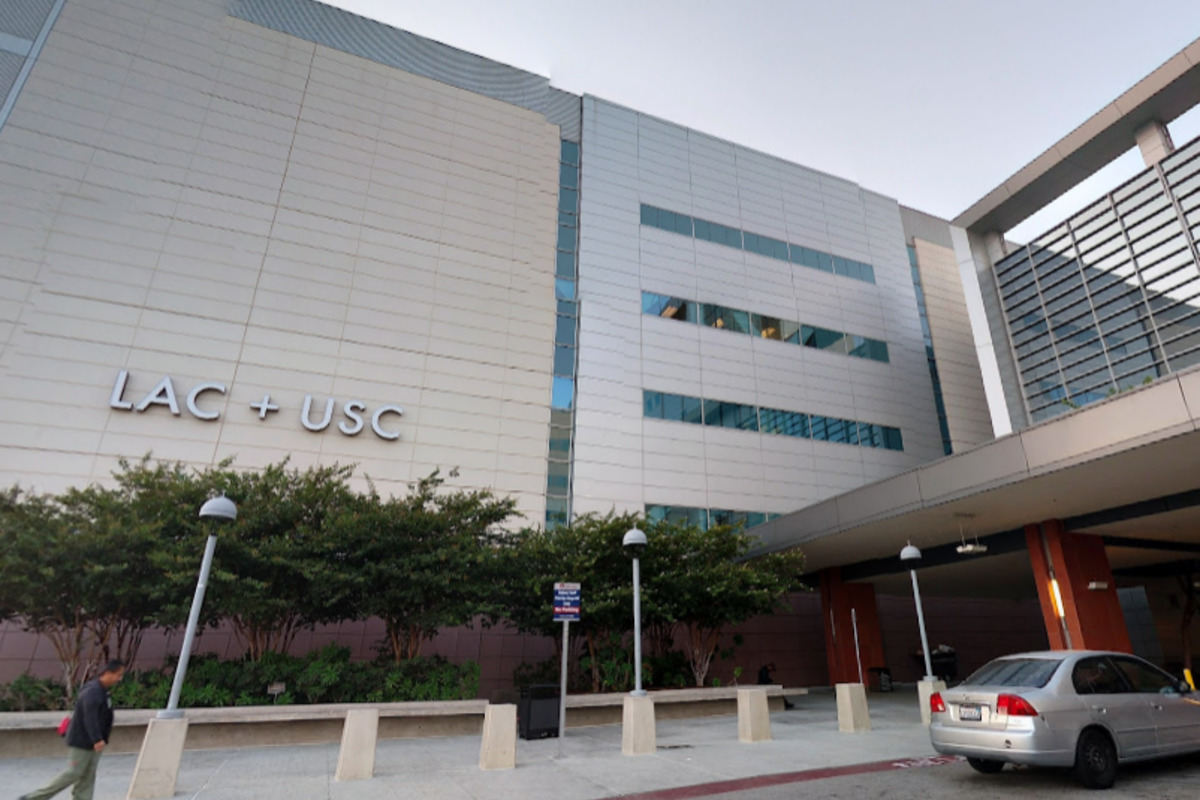
“The time for staged photo-ops, selfies and scripted talking points is over,” Minnesota Representative Tom Emmer, the third-ranking House Republican, said in the bright sunshine with the Washington Monument as a backdrop at a GOP leadership press conference. “The time for deliberate action is now.”
But there was no such action Wednesday because of a fundamental problem. Republicans say they’ll negotiate once the Democrats agree to reopen the government; Democrats say they’ll reopen the government once Republicans agree to negotiate.
“Here’s what we hope: Now that the Republicans have seen they don’t have the votes…they will sit down and negotiate in good faith,” Schumer said on CNN about Democratic demands to extend expiring Affordable Care Act premium tax credits and reverse sweeping Medicaid cuts in Republican legislation passed this summer.
Around the same time, Vance declared on Fox News, “I will go to the Capitol right now to talk to Chuck Schumer and Senate Democrats about premium support for the Affordable Care Act, but only after they’ve reopened the government.”
Lawmakers confirmed there’s little talking going on across the aisle about the shutdown, especially at the leadership level. House Minority Leader Hakeem Jeffries, a New York Democrat, said at a news conference in a studio inside the Capitol that since a White House meeting on Monday with bipartisan congressional leaders “it’s been radio silence from Republicans.”
Senate Majority Leader John Thune, a South Dakota Republican, didn’t sound like he was in a negotiating mood.
“Everybody’s now asking the question: How does this end?” he told reporters. “Well, it ends when the Senate Democrats pick this bill up, passed by the House of Representatives, and vote for it.”
But the Republican short-term funding bill failed on Tuesday night to get enough Democratic support to clear the Senate’s 60-vote threshold, triggering the shutdown. And when Thune tried again on Wednesday, the result was an identical 55-45 vote, with just three Democrats supporting the bill and one Republican, Rand Paul of Kentucky, opposing it. There was no indication when the Senate would vote on the bill next.
In the interim, both parties are expending their energy to pin the blame for the shutdown on the other, with each side believing they have the political upper hand.
Banners appeared on several government websites including the Department of Housing and Urban Development, the Agriculture Department, State Department, and the Justice Department saying the Democrats or the “radical left” have shut down the government. The banners raised concerns about violating a law prohibiting the use of taxpayer money for partisan political purposes.
House Republicans also created a video of Democrats, including Schumer, Jeffries, and progressive Representatives Alexandria Ocasio-Cortez of New York and Ayanna Pressley of Boston, railing against past Republican-instigated shutdowns. It played continually on a large screen TV outside House Speaker Mike Johnson’s Capitol office after Republicans featured it at their morning news conference.
Republicans were almost gleeful in asserting the Democrats had walked into a trap, reiterating that the only way out is to accept the basic extension of federal funds until Nov. 21 that the GOP has already voted for.
“They don’t have the high ground in this situation,” said North Dakota Republican Senator Kevin Cramer, echoing Republicans’ argument that Democrats need to accept a continuation of funding before talks can begin. “It warms my heart to say it, because I don’t recall a time ever when Republicans have had the high ground during a government shutdown.”
But Democrats insisted they have the upper hand.
“I can tell you, this notion that we won’t sit down and talk to you is not very popular with the American people,” said Senator Dick Durbin of Illinois. Two national polls released Tuesday found more Americans would blame Republicans for the shutdown than Democrats. But one of those surveys, by the New York Times and Siena University, also found that 65 percent of respondents said Democrats should not shut down the government if their demands are not met.
Democrats say they don’t trust that Republicans will keep their promise to negotiate if Democrats vote to reopen the government. In a news conference with fellow Democratic leaders, Revere Representative Katherine Clark derided the idea Democrats would take a “pinky swear we’ll get to health care some day soon, just not right now.”
Democrats also pointed to the Trump administration’s actions over the last several months to defy congressional authority as a reason they have little faith in compromise. Those actions include mass firings of federal workers, shuttering of congressionally approved programs, and intentionally refusing to spend money that Congress has appropriated.
But Democrats have focused their message on the need to extend the enhanced Affordable Care Act tax credits that expire on Dec. 31, saying action is necessary because open enrollment notices are being sent out.
“If it’s a true negotiation, then [Vance] will show up now and tell us what offers the Republicans are willing to make to keep Americans from losing their health care,” said Massachusetts Senator Elizabeth Warren. “We’ve been asking the Republicans to negotiate since they passed the law that will drive up health care costs for millions of Americans and there have been exactly zero responses to that.”
But Senator Thom Tillis, a North Carolina Republican, said Democrats have gone too far by trying to use the shutdown as leverage.
“We know that the ACA subsidies are here until the end of the year,” he said. If Democrats aren’t willing to act in good faith and pass the short-term government funding bill before working on extending the tax credits, Tillis said, “why would we waste our time?”
Some Democrats held out hope that Trump would get involved to try to strike a deal out of fears the expiration of the tax credits could be politically damaging to Republicans.
“Trump’s the key here,” said Senator Peter Welch, a Vermont Democrat. “As far as I know, he has not authorized Republicans to talk.”
But Cramer was dubious that Trump intervening was the solution.
“Well, perhaps, but they tried that,” he said of Trump’s Monday meeting with congressional leaders. “The negotiation will happen after we open the government and everybody’s back at work “



